 The intersection of logic and science is tricky to navigate. While science at Christ’s College was not Charles Darwin’s major, as the “father” of evolution with ministry plans, navigating this intersection with conflicting forces determined the course of his theory of natural selection.
The intersection of logic and science is tricky to navigate. While science at Christ’s College was not Charles Darwin’s major, as the “father” of evolution with ministry plans, navigating this intersection with conflicting forces determined the course of his theory of natural selection.
In a recent British poll, only the Bible was narrowly voted as more valuable to humanity than the Origin of Species. Darwin argued that life on Earth is united into a single tree of life by common descent – all organisms are from one common ancestor.
However, a scientific consensus on the role of natural selection in evolution continues to escape the world’s largest science organizations. No other theory is more controversial than evolution. Whether the Origin of Species describes a scientifically valid natural law or is a philosophical argument continues as the elephant in the room – as it was in 1859.
Examining the changing perspectives on logic and science during the nineteenth century gives insight into how Darwin navigated through this tricky intersection and whether the Origin of Species developed as a philosophy or scientifically valid theory.
Developing the Principles of Science
 The principles of science modernized western civilization beginning with Polish astronomer Nicholas Copernicus (1473-1543) (pictured left). By applying inductive reasoning, Copernicus (pictured right) upended Aristotle‘s theory that the Earth is the center of the universe (heliocentrism) – launching the Scientific Revolution.
The principles of science modernized western civilization beginning with Polish astronomer Nicholas Copernicus (1473-1543) (pictured left). By applying inductive reasoning, Copernicus (pictured right) upended Aristotle‘s theory that the Earth is the center of the universe (heliocentrism) – launching the Scientific Revolution.
Established in 1660 by King Charles II, the Royal Society of London has since served as the oldest continuously existing Society to advance the principles of science – known as the scientific method. Charles Darwin was elected as a member of the Royal Society in 1839.
Science’s most influential contributor, Isaac Newton (1642-1727), served as president of the Society for over 20 years. The Society awarded Darwin the Royal Medal in 1853 for his scientific achievements in the Geological Observations on South America (1846) and Fossil Cirripedia of Great Britain, Section Lepadidae, Monograph of the Circhipeda (1851) (Book diagram pictured right). Neither work inferred or mentioned evolution.
The Society characterized its purpose by adopting the official Latin motto of “Nullius in Verba” – meaning “Take nobody’s word for it” (illustrated left). As the Society explains the meaning of the motto –
“To withstand the domination of authority and to verify all statements by an appeal to facts determined by experiment.”
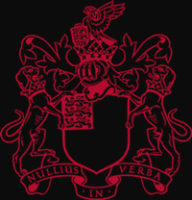 The Society prioritized facts and experimentation over preconceived concepts, premises, ideas, or philosophy – a process known as inductive reasoning. This process, credited to Marcus Tullius Cicero, a leading Roman intellectual, originated from the Latin word inducere, meaning “lead” or “introduce.”
The Society prioritized facts and experimentation over preconceived concepts, premises, ideas, or philosophy – a process known as inductive reasoning. This process, credited to Marcus Tullius Cicero, a leading Roman intellectual, originated from the Latin word inducere, meaning “lead” or “introduce.”
Inductive reasoning was Darwin’s approach early in his career. As Darwin explained in his Autobiography –
“My first notebook was opened in July 1837. I worked on true Baconian principles and without any theory collected facts on a wholesale scale.”
These principles, developed by Francis Bacon (pictured right), an English philosopher, and statesman, established the guiding parameters of the scientific method throughout the stages of the scientific revolution.
In 1838, however, Darwin switched to the deductive reasoning approach of influential English economist Robert Malthus, noting in his Autobiography –
“In October 1838, that is, fifteen months after I had begun my systematic inquiry, I happened to read for amusement Malthus on Population… Here, then, I had, at last, got a theory by which to work.”
The main difference between inductive and deductive reasoning is that inductive reasoning aims to develop a theory while deductive reasoning tests an existing theory. Inductive reasoning moves from specific observations to broad generalizations; deductive reasoning reverses the order.
Pioneering scientists of the revolution included Andreas Vesalius (1514–1564), François Viète (1540–1603), John Napier (1550-1617), Francis Bacon ( 1561-1626), Galileo Galilei (1564-1642), Johannes Kepler (1571-1630), William Harvey (1578–1657), Blaise Pascal (1623-1662), Robert Boyle (1627-1691), Nicholas Stenonius (1631-1686), Antonie van Leeuwenhoek (1632–1723) and John Ray (1672-1705).
Logic and Science Cross-Winds
 On returning from his 5-year global voyage on the HMS Beagle(pictured left), Darwin’s search for a scientific explanation for the origin of species encountered cross-wind pressures from the increasingly popular Age of Enlightenment movement – a logic dilemma between science and philosophy.
On returning from his 5-year global voyage on the HMS Beagle(pictured left), Darwin’s search for a scientific explanation for the origin of species encountered cross-wind pressures from the increasingly popular Age of Enlightenment movement – a logic dilemma between science and philosophy.
In his grandfather’s footsteps, Erasmus Darwin, Charles gradually drifted with the cross-winds, departing from the scientific method to introduce his theory of natural selection. Darwin justifies his reasons in the Origin of Species by arguing –
“On the view that each species has been independently created, with all its parts as we now see them, I can see no explanation. But on the view that groups of species are descended from some other species, and have been modified through natural selection, I think we can obtain some light.”
Eventually, natural selection merged as Darwin’s deductive premise to undermine the biblical account – not because of any scientifically valid evidence. In the Descent of Man (1871), Darwin reaffirms his motivation as philosophical, not scientific –
“If I have erred in giving to natural selection great power, which I am very far from admitting, or in having exaggerated its power, which is in itself probable, I have at least, as I hope, done good service in aiding to overthrow the dogma of separate creation.”
Natural selection justified Darwin’s necessity for a “natural” mechanism to justify his premise to overthrow the biblical account. In his Autobiography, Darwin explains how he gradually gained this new perspective of the biblical account as a “false” history –
“I had gradually come by this time to see the Old Testament, from its manifestly false history of the world.”
The pervasiveness of his new premise was wide-ranging. Contrary to his ministry plans as a graduate of Christ’s College at Cambridge University, Darwin (pictured right) shockingly concluded –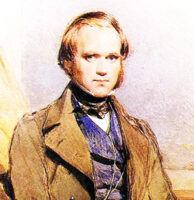
“Thus disbelief crept over me at a very slow rate, but at least it was complete. The rate was so slow that I felt no distress and have never since doubted even for a single second that my conclusion was correct. I can hardly see how anyone ought to wish Christianity to be true, for
if so, the plain language of the text seems to show that the men who do not believe, and this would include my Father, Brother, and almost all my best friends, will be everlasting punishment. This is a damnable doctrine.”
As Enlightenment continued to undermine the authority of the biblical account, Darwin increasingly pivoted to a natural explanation for life – evolution.
The Origin of Species
Enlightenment free speech and thought re-energized the widespread resolve among naturalists to develop logical explanations for all of nature’s mysteries. The Origin of Species was an immediate success; all 1,250 printed copies of the book sold out on the first day, with 3,800 copies sold during its first year of publication. As Darwin noted –
“[It] has sometimes been said that the success of the Origin proved ‘that the subject was in the air… ‘men’s minds were prepared for it.'”
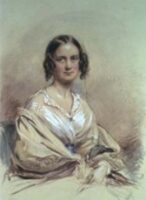 Since Darwin’s wife, Emma (pictured left), was far from declaring Christianity a “damnable doctrine,” he assured her his work was a “considerable step in science.” Yet, he never publicly stated or implied that the Origin of Species was founded on scientific principles.
Since Darwin’s wife, Emma (pictured left), was far from declaring Christianity a “damnable doctrine,” he assured her his work was a “considerable step in science.” Yet, he never publicly stated or implied that the Origin of Species was founded on scientific principles.
Amongst his colleagues, Darwin was transparent. in the year before publication in 1859, Darwin explained to American naturalist Asa Gray (pictured right), author of Gray’s Anatomy, that his new approach did not correspond to the principles of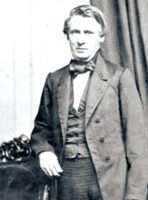 science –
science –
“I am quite conscious that my speculations run quite beyond the bounds of true science.”
Darwin called the Origin of Species “one long argument from the beginning to the end” – the antithesis of a scientific treatise. While the book has one illustrative diagram, there are no tables or graphs with “facts.”
Although the Origin of Species emerged as a global phenomenon, the Royal Society never awarded Darwin a Royal Medal again; Darwin abandoned the inductive “bounds of science” with deductive reasoning.
New Approach, Erasmus’s Old Audience
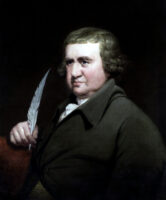 Darwin’s new logic approach resonated with his grandfather’s old, but growing, audience. Erasmus (pictured left) was a leading influence in the Enlightenment movement. However, even as an elected fellow into the Royal Society in 1761, none of his works on evolution were recognized by the Society.
Darwin’s new logic approach resonated with his grandfather’s old, but growing, audience. Erasmus (pictured left) was a leading influence in the Enlightenment movement. However, even as an elected fellow into the Royal Society in 1761, none of his works on evolution were recognized by the Society.
Erasmus’s work on animal classifications, organic laws, disease classifications, and advancing concepts of biological evolution in his two volumes of Zoonomia (1794–1796), however, gained a broad Enlightenment audience with his views, including his “improvements by generation” theory –
“Would it be too bold to imagine that in the great length of time, since the earth began to exist, perhaps millions of ages before the commencement of the history of mankind, would it be too bold to imagine that all warm-blooded animals have arisen from one living filament… delivering down those improvements by generation to its posterity, world without end!”
Logic Forceful Premise
The universe as an intrinsically logical concept emerged as the forceful premise of the Enlightenment movement – a philosophy rooted in rationalism. In their search for a logical explanation for the yet unresolved mysteries of the universe, no stone was left unturned, including Bacon’s use of inductive reasoning driving the scientific method.
 Coining the Latin phrase in the Discourse on Method, “Cogito, ergo sum” (“I think; therefore I am”), René Descartes (1596-1650) of Touraine, France, developed the intellectual foundations of the Enlightenment movement, including a return to the deductive reasoning process to resolve nature’s persistent mysteries.
Coining the Latin phrase in the Discourse on Method, “Cogito, ergo sum” (“I think; therefore I am”), René Descartes (1596-1650) of Touraine, France, developed the intellectual foundations of the Enlightenment movement, including a return to the deductive reasoning process to resolve nature’s persistent mysteries.
Descartes (pictured left) is now known as the father of modern philosophy and algebraic geometry. His approach profoundly influenced Modern Western thought, giving rise to the Enlightenment’s new philosophical system, reminiscent of Aristotle’s. Known as Cartesianism, Descartes erroneously argued that all knowledge could be acquired through deductive reasoning.
In the decades before the Origin of Species, Descartes’s deductive approach continued to gain popularity, including Darwin, challenging the scientific principles developed by Bacon. In his letter to Henry Fawcett, an Enlightenment statesman, economist, and colleague, Darwin argues for the deductive approach –
“About 30 years ago, there was much talk that Geologists ought only to observe & not theorize; & I well remember someone saying, that at this rate a man might as well go into a gravel-pit & count the pebbles & describe their colours. How odd it is that everyone should not see that all observation must be for or against some view if it is to be of any service.”
Descartes Versus Bacon; Logic and Science
The popularity of Descarte’s deductive approach challenged the use of Bacon’s scientific method. Descartes argued that all truth is discoverable using human reasoning. Bacon, however, had argued truth must be discoverable independent of reasoning.
Given the scope of unsolved mysteries, intellectuals and Enlightenment scientists increasingly resonated with Descartes’s deductive approach, including John Locke (1632-1704) and David Hume (1711-1776). As WIKIPEDIA –
“In an anthropocentric revolution, the human being is now raised to the level of a subject, an agent, an emancipated being equipped with autonomous reason… This anthropocentric perspective of Descartes’s work, establishing human reason as autonomous, provided the basis for the Enlightenment’s emancipation from God and the Church.”
 The philosophical tale in The History of the Decline and Fall of the Roman Empire (1776), written by François-Marie Arouet (1694-1778), best known as Voltaire (pictured left), commented on, criticized, and ridiculed events, thinkers, popular philosophies, and religions of the time. As a deist, Voltaire argued –
The philosophical tale in The History of the Decline and Fall of the Roman Empire (1776), written by François-Marie Arouet (1694-1778), best known as Voltaire (pictured left), commented on, criticized, and ridiculed events, thinkers, popular philosophies, and religions of the time. As a deist, Voltaire argued –
“As Christianity advances, disasters befall the [Roman] empire—arts, science, literature, decay—barbarism, and all its revolting concomitants.”
In France, Paris merged as the center of the Enlightenment movement, challenging traditional doctrines and dogmas. Tragically, the movement sparked the French Revolution and the Reign of Terror, resulting in over 16,600 executed in Paris and providences over two years.
To understand the origin of life, inductive reasoning was abandoned. By adopting the premise that the universe must be intrinsically logical, non-logical explanations were excluded, including the Genesis account. Philosopher Immanuel Kant, using this approach in his Critique of Judgement (1792), reasoned –
“A daring venture of reason… [in which] one organic being [is] derived from another organic being, although from one which is specifically different; e.g., certain water-animals transform themselves gradually into marsh-animals and from these, after some generations, into land-animals.”
Evolution emerged as a cardinal ideology of the Enlightenment movement – a natural explanation for the origin of life. By the mid-nineteenth century, the movement’s influence increasingly gained traction amongst the intellectual elite. Darwin turned to evolution since the biblical explanation was increasingly unpopular.
The Origin of Species was “one long argument, Darwin explained, “from the beginning to the end” – music to Descartes: treason to Bacon. While the book includes one diagram, objective measurable “facts” are not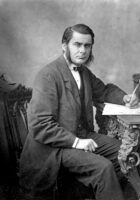 found in any table or graph, nor any of the voluminous text. The Origin of Species is a supreme history of science text, but not a science textbook. As “Darwin’s Bulldog,” Thomas Huxley explains –
found in any table or graph, nor any of the voluminous text. The Origin of Species is a supreme history of science text, but not a science textbook. As “Darwin’s Bulldog,” Thomas Huxley explains –
“[the book] Is one of the hardest books to understand thoroughly that I know of.”
The Royal Society, nor any other science organization, awarded a medal to Darwin for The Origin of Species. However, the American Philosophical Society awarded Darwin an honorary membership in 1869.
Natural Selection Deductive Logic
Natural selection is the logical construct Darwin used to explain life, becoming one of the longest-running controversial theories in the history of natural sciences.
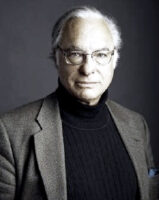 Natural selection exemplifies what happens to a theory founded “beyond the bounds of science.” Even evolution scientists remain critical. Evolution scientists Jerry Fodor of Columbia University and Massimo Piattelli-Palmarini (pictured left) of the University of Arizona, in What Darwin Got Wrong, explain –
Natural selection exemplifies what happens to a theory founded “beyond the bounds of science.” Even evolution scientists remain critical. Evolution scientists Jerry Fodor of Columbia University and Massimo Piattelli-Palmarini (pictured left) of the University of Arizona, in What Darwin Got Wrong, explain –
“We have both spent effort and ink… to show that Darwin’s theory of natural selection is fatally flawed.”
The views of Fodor and Piattelli-Palmarini are widely held. Even in the words of powerhouse evolution advocate Jerry Coyne of the University of Chicago –
“We must stop pretending we understand the course of natural selection.”
Niles Eldredge (pictured right), an American biologist, and paleontologist of the American Museum of Natural History, a long-time collaborator with legendary evolution advocate Stephen Jay Gould, contends –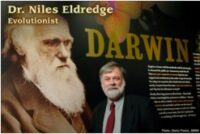
“In the literal sense of the word, no doubt, natural selection is a false term.”
In natural selection’s truth or consequence moment, not a single scientific organization has developed a scientific consensus on natural selection in the twenty-first century; despite numerous attempts,
Darwin, a Scientist?
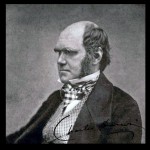 Early in his career, Darwin approached his work following the principles of science and was awarded a Royal Medal in 1853 for his contributions to geology (1846) and paleontology (1851). – Darwin practiced as a scientist then.
Early in his career, Darwin approached his work following the principles of science and was awarded a Royal Medal in 1853 for his contributions to geology (1846) and paleontology (1851). – Darwin practiced as a scientist then.
Gambling on deductive reasoning, Darwin used logic to argue in The Origin of Species that natural selection was the “means” accounting for life. However, he never again received an award from any scientific organization.
Natural selection is a philosophical concept, not a scientifically valid theory. The intersection of logic and science is tricky to navigate since logic can reach “beyond the bounds of science.”
Genesis
Empirical scientific evidence, not necessarily logic, is always compatible with the Genesis account written by Moses. 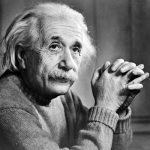
In the words of Albert Einstein, a German-born theoretical physicist born in Germany, 1879-1955, Physicist Developed the general theory of relativity, one of the two pillars of modern physics, and is best known in popular culture for his mass-energy equivalence formula E = mc2 – dubbed “the world’s most famous equation” –
“Everyone who is seriously engaged in the pursuit of science becomes convinced that the laws of nature manifest the existence of a spirit vastly superior to that of man, and one in the face of which we with our modest powers must feel humble.”
The theory of evolution is a philosophy, not a valid scientific fact.
Refer to the Glossary for the definition of terms and to Understanding Evolution to gain insights into understanding evolution.

